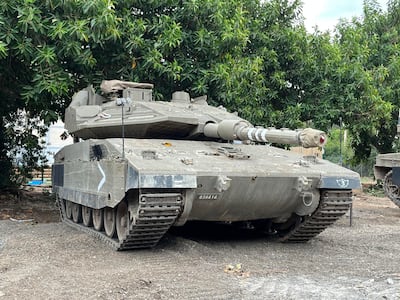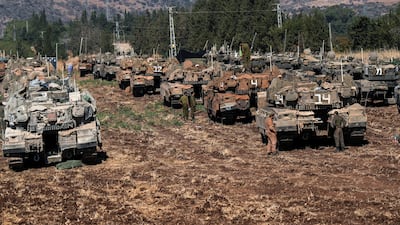Live updates: Follow the latest from Israel-Gaza
Israel and Hezbollah are facing off over the prospect of a ground war, which could see Israel attempt to force the group up to 30km deeper inside Lebanon, Israeli Chief of Staff Lt Gen Herzi Halevi told troops on Friday.
The Israelis say an invasion would place most Hezbollah rockets and missiles out of range of Israeli communities, where about 60,000 Israelis have been displaced following Hezbollah’s intervention in the Gaza war, which began a day after Hamas’ assault on Israel on October 7. In a massive Israeli bombardment this week, up to 500,000 Lebanese have also fled their homes.
Both sides will have been thinking deeply about their brief, destructive war in 2006, that ended inconclusively, but was widely seen as an Israeli defeat. For Israel, it led to 50 internal inquiries reviewing its armed forces, leading to the Teffen 2012 plan, that emphasised better training and use of drones.
Since then, Hezbollah has become far better armed, with deeper tunnels and bunkers. It may have 10 times the infantry strength (about 40,000 today) and 10 times its rocket arsenal, perhaps 150,000 rockets and missiles despite expending about 9,000, and having others bombed.
It has far more drones, both the fixed wing explosive type which fly into buildings over hundreds of kilometres away and are difficult to shoot down, and smaller quadcopter drones that can drop bombs or can fly directly into targets. Its forces also have more combat experience, from supporting Bashar Al Assad in the Syrian civil war.

Israel too, has grown in power, largely after evaluating its disastrous 2006 war. Its forces, according to a government inquiry on the 2006 invasion, the Winograd Commission, said they lacked training for high intensity combat, having spent years chasing lightly armed militants in the occupied West Bank or controlling riots there. The Israelis went into Lebanon badly equipped, with weakly armoured vehicles such as the Humvee, which can be easily destroyed by roadside bombs or missiles.
Today, it has some of the most heavily protected tanks such as the Merkava, able to parry missiles with an explosive Trophy “active protection system”, and fighting vehicles like the Namer, based on the chassis of the same heavily armoured tank. This could make a significant difference – Israel lost 11 Merkava tanks in one missile ambush in 2006.

Nonetheless, Lebanon presents deep valleys and rolling hills, ideal for hidden observation and ambushes. Amid that environment, Israeli soldiers found their logistics were unprepared, and some units ran low on food and water in blazing heat. Fighting in southern Lebanon in hot weather is “no fun,” one Israeli officer recently told The National off record.
Israel now also has far more drones, including dedicated units fielding them, and regularly trains for war with Hezbollah, including drills based on simultaneous war with the group and Hamas. Its air force is vastly more deadly than in 2006.
Israel's lost war
The Israelis lost 121 soldiers in that conflict, despite air supremacy, and hundreds more were wounded, failing to clear south Lebanon of Hezbollah.
Its initial advances were no more than a few kilometres, because experts say forces were sent in bit by bit, negating Israel's numerical advantage. In one case, a postwar report noted, a battalion of less than 1,000 men asked to control a town of 5,000 buildings.
When a deeper advance happened with 30,000 men in the final days of the war, it was criticised by some Israeli officers as being for show, rather than having concrete objectives. Finally, the war ended with Israeli withdrawal, under international pressure.

“They bowed to international pressure quite quickly. They're not going to do that this time. If they step across that border, they are going to stop when Hezbollah is not a threat,” says Sam Cranny-Evans, an associate fellow at RUSI, a UK defence think tank, and independent defence consultant.
Officers complained bitterly that in addition to inadequate equipment, intelligence briefings were poor and many soldiers had no idea they would encounter deeply buried bunkers and tunnels, from which Hezbollah ambushed them.
“In 2006 there are a lot of examples where the Israelis were more passive than you would expect. Tanks would be hit with multiple anti-tank guided missiles, because they were very visible on a hill, and they were supposed to provide presence and deterrence by just being there. I don't think a ground incursion this time, given the context, is going to be like that,” Mr Cranny-Evans says.
Lebanon suffered around 1,200 deaths, mostly civilians, and estimates of Hezbollah killed vary from less than 200 to around 500. Israeli air strikes, hitting bridges, roads, fuel storage sites, Beirut International Airport and other infrastructure, along with hundreds of Hezbollah-linked targets, caused billions of dollars’ worth of damage. Forty-four Israeli civilians were killed by Hezbollah rockets.
Limits of air power
On the face of it, few Hezbollah fighters could survive Israel’s current bombing. Israel said it struck 1,600 targets in 24 hours of operations on Monday, 22 per cent of the entire target count of the 2006 war, killing around 700 Lebanese in a terrifyingly short period.
But according to a US assessment, the air bombardment before 2006’s ground attack, known as Operation Ice Breaker, might have diminished Hezbollah’s combat power by 7 per cent. Many strikes hit decoy bunkers, and it's not clear the extent Hezbollah has pursued the same approach.
Nonetheless, the group has likely been hit hard, experts told The National last week, coming after a series of covert attacks where thousands of Hezbollah pagers and radios were secretly rigged with bombs by the Israelis, killing scores and injuring thousands.
Those attacks, and many strikes on high level commanders, show just how badly Hezbollah’s internal communications have been compromised. It’s not clear therefore, how the group could co-ordinate its forces if the Israelis invade.
Fighting for every metre
Exactly how much they co-ordinate will be a strategic decision, Mr Cranny-Evans says. The group may choose to stand and fight, incurring heavy losses, also requiring some means of communication, while knowing the Israelis are listening.
Or they could choose to fight “ephemerally,” Mr Cranny-Evans says, ditching uniforms, hiding underground or in villages, and waiting for the Israelis to give up, before rebuilding their power.
The defence expert says modern Israeli doctrine has taken this into account, allowing small units to rapidly strike enemy fighters who themselves are mounting hit and run attacks, shooting off a couple of magazines of bullets or firing a rocket before fleeing.
The system for rapid attack is called Fireweaver, which its designers say “connects all battlefield elements in real time and instantly selects the most relevant shooter for each target – enabling comprehensive situational awareness and simultaneous, precision strikes.”
“Fireweaver is in some of the armoured brigades, it enables a commander to have an oversight of every single linked sensor on the battlefield, and connect it with effectors (weapons). And it's built around that ephemeral threat where the enemy knows, ‘we're going to empty this magazine, we're going to fire these two rockets, and we've got to be out of there.’ It's built around getting them in between those two magazines being changed,” Mr Cranny-Evans says.
“Granted, not every single unit will operate at that level of capability, but the ones they have that can will be very punchy, and the lethality and the firepower that they carry with them is significant. I think if a ground incursion comes and if Hezbollah chooses to fight at all, there will be a lot of destruction.”
This technological dominance will not necessarily determine a victor. Even with no secure communications and being spotted by swarms of drones, “people just find a way to adapt, because they don't want to die. So if communications are key, they'll find a way to communicate,” he says, saying civilians could be used to pass messages, a common tactic used by militias.



